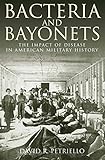|
Bacteria and Bayonets: The Impact of Disease in American Military History, by David Petriello
Philadelphia: Casemate, 2016. Pp. 264. Illus., notes, biblio., index. $32.95. ISBN: 1612003419.
How Disease Affected American History American historian Petriello, author of several works in military history and political biography, looks at the role of disease in American military history, and, of course, by extension the role of disease in American history as a whole. Petriello opens by reminding us that evidence from both the archaeological record and even Native American oral tradition indicates the presence of epidemic diseases in the Americas well before the Columbian exchange. He goes on to discuss how �Old World� diseases played an important, and despite rhetoric generally unintended role, in the European conquest of the Americas. Petriello then focuses increasingly on the influence of disease on the early English settlements in North America and on the infant United States, with an increasing focus on military matters. Initially, of course, disease was more deadly than warfare; during the Revolutionary War disease may have accounted for as much as 90 percent of American deaths. But developments in medicine and sanitation would gradually change that; the Patriot victory in the Revolutionary War was won in part due to the introduction of inoculation, which greatly reduced the incidence of small pox. This trend continued through the nineteenth century, as medicine evolved, so that by the early twentieth century the death rate from disease was enormously reduced. Nevertheless, even in the Second World War in some theatres disease still caused more casualties than combat, despite the introduction of atabrine and penicillin. Petriello brings his account down to the present operations in the Middle East, which are characterized by a number of new � if less devastating � threats from disease. At time Petriello makes some interesting observations. He notes, for example, instances during operations when a particular commander was laid low at a critical moment, and also points out some instances in which a general was not taken ill despite epidemic conditions, which arguably influenced the course of events in ways we can but speculate about, but is a useful reminder that what didn�t happen can be as important as what did. Although the topic of disease and its influence on history has been dealt with before, this is a very good, entertaining, and thoughtful work. ---///---
Reviewer: A. A. Nofi, Review Editor

Buy It At Amazon.com
|